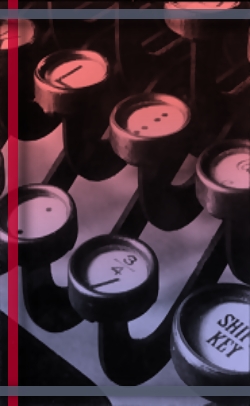Here's the way it is ... Scripts come to me to edit, or to represent (I'm head of an agency's literary department) and it breaks my heart that very often (too often) what I'm getting has no way in this world of ever even being read by those in a position to buy the material. And the writer has no clue. So ... let's take a look at the most common mistakes that keep scripts from being seriously considered, or even read, and then let's fix them. (I recommend you print out this page and keep it to study as you write)
Remember: A script is not a story. A treatment is your story. A script is only a set of production notes to a film crew.
- Use a light cardstock cover and bind with 3 brads.
- Put nothing on the cover except the title. Use a larger than normal point size, put it
about 1/4 of the way down on the page, centered. Nothing else goes on your cover.
- Inside the cover, the first page is your Cover Sheet. On this goes the title
(centered, about a 1/4 of the way down, in about a 14 point size, underlined and
in quotation marks). Drop down 2 spaces and, centered under the title, write the
word 'by'. Drop down 2 spaces, centered under that, write your name.
- Your Writers' Guild of America registration number goes in the lower left corner.
You do NOT have to be a WGA member to register your work (see Writers Guild Information
page on this website). If you send out your material without this information,
you're inviting theft.
- Your address, city-state-zip, phone number, and email address goes in the lower
right corner.
- Nothing else goes on this page! Not your copyright information (if you have it),
not the draft number and certainly not the date.
- The first script page is not numbered. The first words on the page are FADE IN.
- A link to a sample script page, with complete explanations, is at the bottom
of this page. STUDY IT!
- Script pages MUST be filled!!! Start one and a half inches from the top, go to
approximately one and a half inches from the bottom. The left margin will be one
and a half inches from the left and the right margin will be approximately one and
a half inches from the right edge of your paper, though it will vary (sometimes being
shorter, but never longer).
- A script page CANNOT end on anything except a period!!!!
- All dialogue MUST have a character's name over it.
- There are 4 tabs on a scipt page. Tab #1 is for dialogue which runs in a rectangular
box, approximately 3 1/2 inches across on your page. Tab #2 is for Dialogue Direction.
This is used in case there may be some question as to how the actor should
deliver the line and also for directives such as (pause), (a beat), (to Jane), etc. It
is NOT used to give the actor an action direction (he crosses the room) or for any
actor other than the one talking. Tab #3 goes smack in the center of the page and
is for your character's name. Every name starts at exactly the same spot on a page!
Tab #4 is for CONTINUED (if the scene continues to the next page), TIME DISSOLVE,
but never for the words CUT TO as those are simply not used in scripts today since
someone realized that editors are among the brightest in the Industry and have figured
out all by themselves that they MUST cut in order to get from one scene to the next,
and don't need a writer to instruct them.
- Your script should run no less than 110 pages, no more than 135 with 120-125
the ideal. If you're writing for televison, that's a different situation altogether.
I'm addressing myself to feature film scripts.
- Do NOT send backup material with your script. Do NOT send photographs or a
Xerox of your graduation picture, or anything else. Just the script.
- Do NOT number scenes.
- Do NOT use any camera angle unless it's absolutely necessary and then only sparingly -
and only if you're absolutely sure you know what you're asking for.
- And, for cryin' in the beer, write on normal typing paper! You have no idea
of the wild assortment of paper I see a script written on. What a waste. Waste of a
story, waste of time and postage, waste of paper. Wasted dream.
Sample Script Page
|








